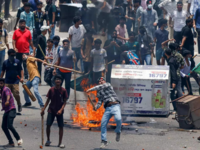
Reports indicate that the attacks started almost immediately after Sheikh Hasina's abrupt departure from office. The political vacuum created by her resignation has led to heightened tensions and a surge in attacks by extremist groups. Local authorities have struggled to control the situation, with security forces overwhelmed by the scale of the violence.
The assailants, reportedly fueled by extremist rhetoric and political instability, have focused their aggression on Hindu properties. This pattern of violence underscores a troubling trend where political shifts and leadership changes precipitate unrest against minority communities. The attacks have included vandalism of temples, arson of homes, and physical assaults on residents, marking a period of intense fear and uncertainty for the affected families.
International observers and human rights organizations have condemned the violence, calling for immediate intervention and protection for the targeted communities. The situation has drawn attention from global leaders and humanitarian groups who are urging the Bangladeshi government to restore order and provide adequate security for the minority population.
The political context of this violence is rooted in longstanding tensions between different ethnic and religious groups in Bangladesh. Sheikh Hasina's resignation has been a catalyst for these tensions, with various factions seizing the opportunity to advance their agendas through acts of violence and intimidation.
Efforts by the Bangladeshi authorities to address the situation have been met with mixed results. While there have been promises of increased security and investigations into the violence, many residents remain skeptical of the government's ability to provide lasting solutions. The response has been criticized for being too slow and inadequate, leaving many communities vulnerable to further attacks.
Amidst the turmoil, local Hindu leaders and community activists are calling for solidarity and support from both domestic and international allies. They emphasize the need for a coordinated response to address not only the immediate violence but also the underlying causes of the conflict. The situation highlights the broader challenges of maintaining religious harmony and political stability in a diverse and rapidly changing society.
As Bangladesh navigates this period of instability, the international community continues to monitor the situation closely, with a focus on ensuring that the rights and safety of all citizens are upheld. The path forward will require a concerted effort from all sectors of society to rebuild trust and restore peace in the affected areas.
